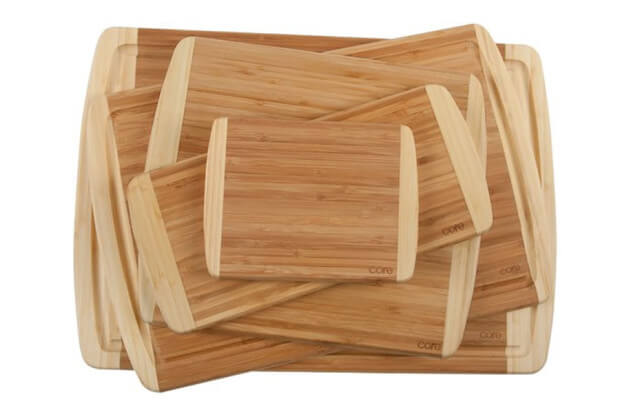Top Five Benefits of a Bamboo Cutting Board
Posted by Grant Chen on 17th Oct 2024

In the last few years, bamboo has become one of the most popular materials for cutting boards due to its many benefits. While bamboo has always been known to have many advantages over traditional woods, only in the recent decade did the technology emerge to mass process bamboo from a round timber into flat timber. Bamboo is a major seller with home chefs and here are the top five benefits of using bamboo cutting boards.
Low Maintenance Wood
Wood selection has always been the most important part of selecting a good cutting board. Classical cutting boards have normally been made of out dense woods, such as maple, walnut or cherry vs porous woods such as red oak. Having a dense wood is important, as it keeps out water, which is where bacteria grow and live. Even with high quality wood however, cutting boards usually require regular maintenance with mineral oil or beeswax to keep the wood from cracking and warping.
One main reason bamboo cutting boards have gained popularity in recent years is because they are almost maintenance free due to the hard density of the wood. Bamboo resists retaining water and as a result, will not warp or crack as easily as normal wood. That said, it’s not recommended to put a bamboo board (let alone any cutting board) in a dishwasher due to the extreme heat. Only thicker, plastic cutting boards are considered safe for dishwashers since they generally won’t crack or warp.
If you try to make a habit of wiping dry your bamboo board after washing (and never letting it soak), there’s no reason you shouldn’t be able to keep it for years.
Superior Health and Sanitation
Even the hardest of maple will be scarred by a chefs knife, which will leave pockets for moisture, food particles and bacteria to accumulate. Bamboo, on the other hand, is often dense enough to resist knife scarring and naturally resists water penetration and letting bacteria find a place to form.
That said, it’s always recommended to use proper hygiene methods to clean your bamboo cutting board by using hot water and soap or a dilution of bleach and water (1 tablespoon of bleach per gallon of water).
Bamboo Looks Good
As a naturally light wood with a fine grain, many chefs love the natural look of bamboo and the modern elegance that it conveys. Many designer kitchens now sport large bamboo cutting boards as the grain can be uniform and homogenous, leading to a chic and tasteful look for a stylish kitchen.
Plus, without having to worry about wood scarring, your bamboo board should continue to look smooth and sleek for a long time. In addition, due to the resistance to absorbing water, bamboo is less likely to crack and split like regular wood boards. Bamboo also resists staining, which is often an issue with meats and acidic plants such as tomatoes.
Green, Renewable and Earth Friendly
Properly sourced, bamboo is a highly renewable resource. Most people don’t know that bamboo is technically a grass instead of tree, which is appropriate due to the fact that it’s one of the fastest growing plants on earth. In fact, a normal bamboo shoot can become fully mature within three to six years before it is cut for harvest. On the other hand, maple trees can take over 30 years to fully mature and can live to over 150 years.
Due to the tolerance of bamboo to it’s environment, bamboo is easily grown and often raised organically due to the ease of farming. Its quick growth enables bamboo to be economically harvested, which is why even builders and homeowners have switched to using bamboo due to its great durability and affordability.
Be warned that some bamboo products are processed using formaldehyde and glues, which can leech into your food and gas out over time. You should always check before buying a bamboo board that the manufacturer uses non-toxic treatment methods or has organic practices. Here at CuttingBoard.com, we only carry products which feature formaldehyde-free glues, such as our Bambu and Totally Bamboo line of cutting boards.

